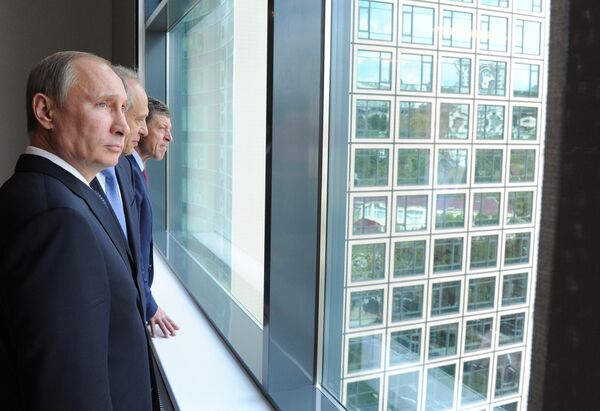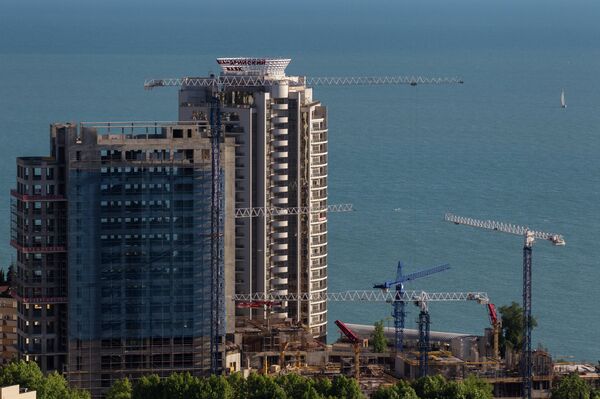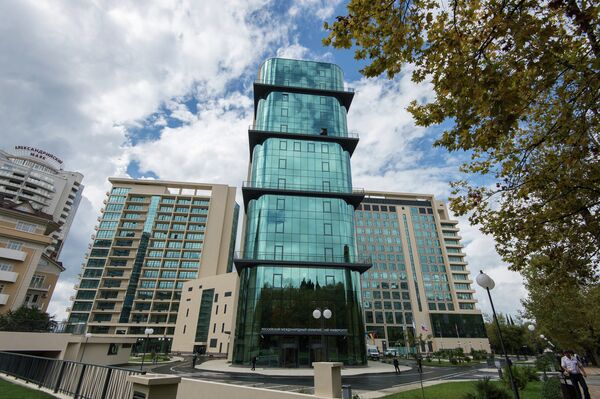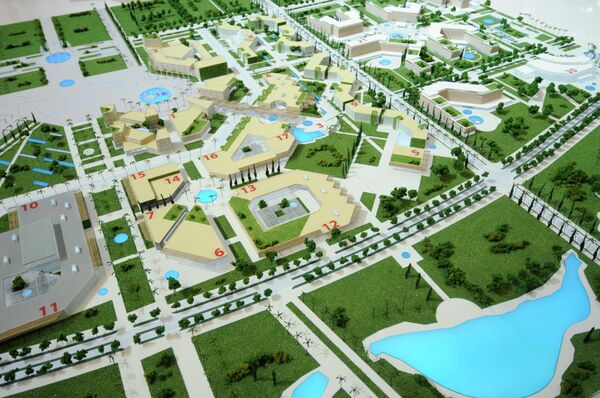SOCHI, February 20 (Alexey Eremenko, RIA Novosti) – The 15-story glass tower that houses the Olympic University in Sochi has the eerie vibe of a high-budget pandemic thriller: immaculately clean and completely deserted.
Normal life should resume when students return from the Olympic venues where they are interning. But their numbers will still average about two people per floor.
The Russian International Olympic University opened in Sochi this September, admitting 27 people from 14 countries, ranging from Russia and Kazakhstan to Botswana, Brazil and Germany. The Olympic reference in the school’s title is bold but somewhat misleading, as the university hopes to train management professionals for the sports industry broadly, not just the Olympics.
But graduates’ employment prospects remain unclear, experts warned, especially for those planning to work in Russia, where managers in professional sports often rely more on personal connections and government backing than on their ability to generate profits.
The university was co-founded in 2009 by Russian Olympic and sports authorities and the privately owned Interros holding, a business conglomerate with interests in metallurgy, real estate, media and transportation.

Russian President Vladimir Putin chairs the board of trustees, but it was tycoon Vladimir Potanin’s Interros that footed the $500 million bill for the project, which includes a campus and a conference hall.
Interros is among the main private investors of the Sochi Olympics, having spent 69 billion rubles ($1.9 billion) on the Roza Khutor ski resort now hosting many Olympic events. (Most of the money for the company’s Olympics-related projects, however, came from state loans that Interros wants restructured.)
This kind of public-private relationship is widespread in Russian professional sport, which often relies on the state – and its ability to mobilize the resources of wealthy businessmen – more than on commercial potential.
But Russia’s sports industry is outpacing overall GDP growth in the country by a factor of six to eight, university rector Lev Belousov said at a press conference in Sochi last week. And that, he believes, reflects a worldwide trend that offers plenty of employment opportunities.
University officials hope attendance will eventually reach 500 a year, including attendees of master classes and students pursuing the Master of Sport Administration degree. The year-and-a-half-long MSA program, conducted in English, now costs $15,000, though the majority of this year’s students enrolled on scholarships provided by Potanin.
The program is taught by 19 professors from 10 countries, including Australia, England and Spain. Courses range from “Olympic ideology” to venue management and market research.
Plans are underway to add a Russian-language program and a postgraduate program in the coming academic year, Belousov told reporters.
“There is money in sports if you know how to manage it,” he said.
The university has high hopes for its Russian graduates.

“I am sure these guys will find employment in our sports industry,” Belousov told RIA Novosti after the press conference, stressing that competent managers who know how to make money for their employers will one day be in demand.
“Those who operate the old way will be expelled by the market, and our guys can work the new way,” he said.
The invisible hand of the market, however, has thus far not been very active in the Russian sports industry.
Vasily Utkin, one of Russia’s most popular sports commentators, told RIA Novosti that Russian sports “exists on sponsor money,” but there’s a “special thing” about that sponsorship: It comes either from the state directly or from companies or businessmen acting on the state’s behalf, although sometimes out of enthusiasm as well.
Well-known examples of the state-business model include top football clubs such as Zenit St. Petersburg and Spartak Moscow, supported by energy giants Gazprom and LUKoil, respectively, and Russia’s biathlon federation, long backed by billionaire Mikhail Prokhorov.
In this system, Utkin said, a manager’s main qualification is not the ability to generate profits, but good relations with a sponsor who wants someone he can trust.
Football club Anzhi Makhachkala provides a vivid example of the pitfalls in such an arrangement. Purchased by billionaire Suleiman Karimov in 2011, the club vied for medals and competed in European tournaments, but had to wave goodbye to most of its star-studded roster and plummeted to the bottom of the 18-team Premier League after Kerimov decided he’d had enough last August and slashed annual funding from $200 million to about $50 million.
An official in the Russian sports establishment echoed Utkin’s comments, telling RIA Novosti that graduates of the Olympic University will face an uphill battle against Russian sports bureaucrats and incumbent managers who adhere to a conservative management style that does not treat sports as a business. The official spoke on condition of anonymity to avoid getting on his colleagues’ bad side.
Nevertheless, there are jobs to be had, given that Russia is actively developing its sports infrastructure. In addition to the Sochi Olympics, it is to host Formula 1 races and the 2018 Football World Cup.
The university’s international students also believe there will be work for them in their home countries.
Ugandan Joseph Collins Ssemmanda, 37, learned about the Sochi university at the Russian House during the 2012 London Olympics, and is under contract to work for Uganda’s Olympic committee for three years after getting his MSA.
He hopes to serve as a consultant for various Ugandan sports federations afterwards, improving their performance, which, he said, currently leaves much to be desired.
“I want to pass the knowledge I obtained here to other people,” said Ssemmanda, whose been nicknamed “Kolenka from Uganda” in Sochi.
Russian Olympic University graduates also have a shot at finding employment and making an impact if they can get in on the ground floor with future venues’ owners, Utkin predicted.
University representatives confirmed they were busy establishing ties with the organizers and venue developers for upcoming events, though they were vague on how well the efforts were going.
“In the worst-case scenario, an MSA is like an MBA, only about sports,” Utkin said, “and a good business manager doesn’t really care what business to manage.”




